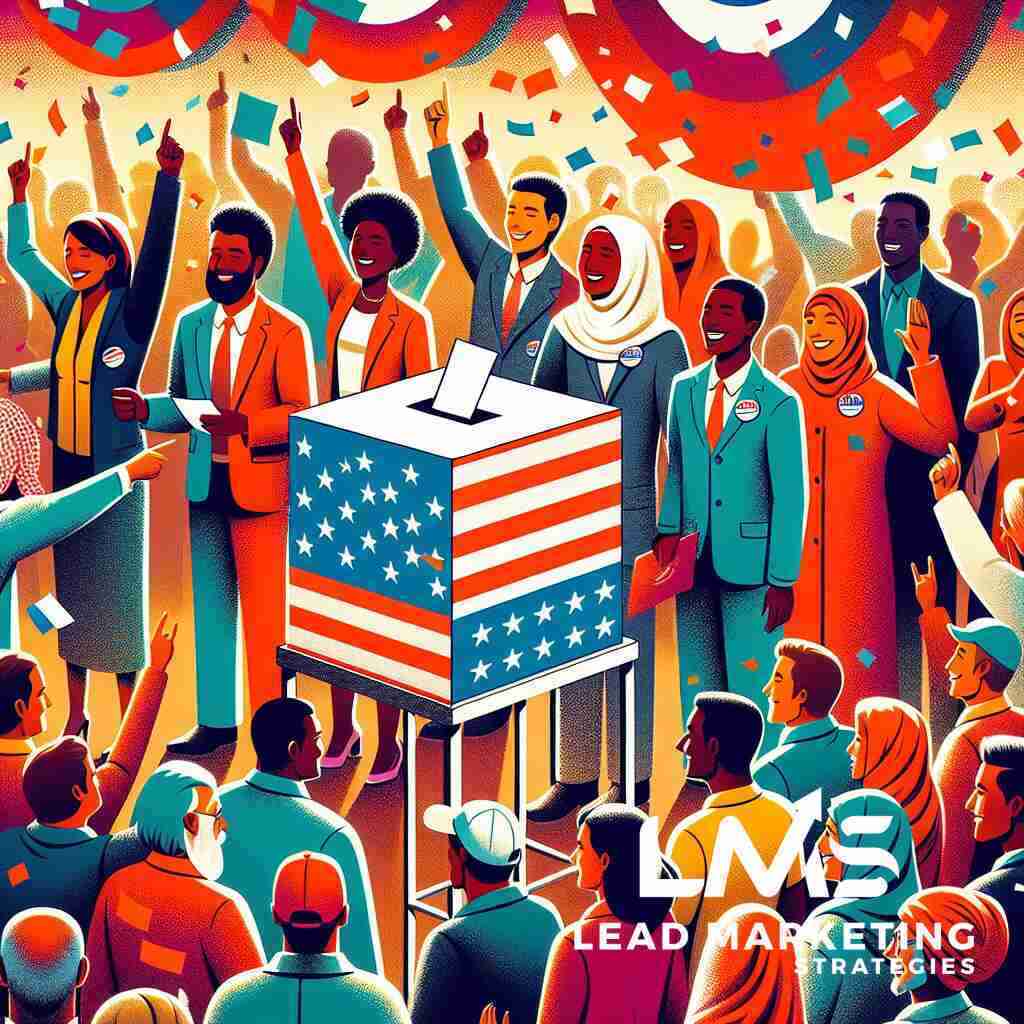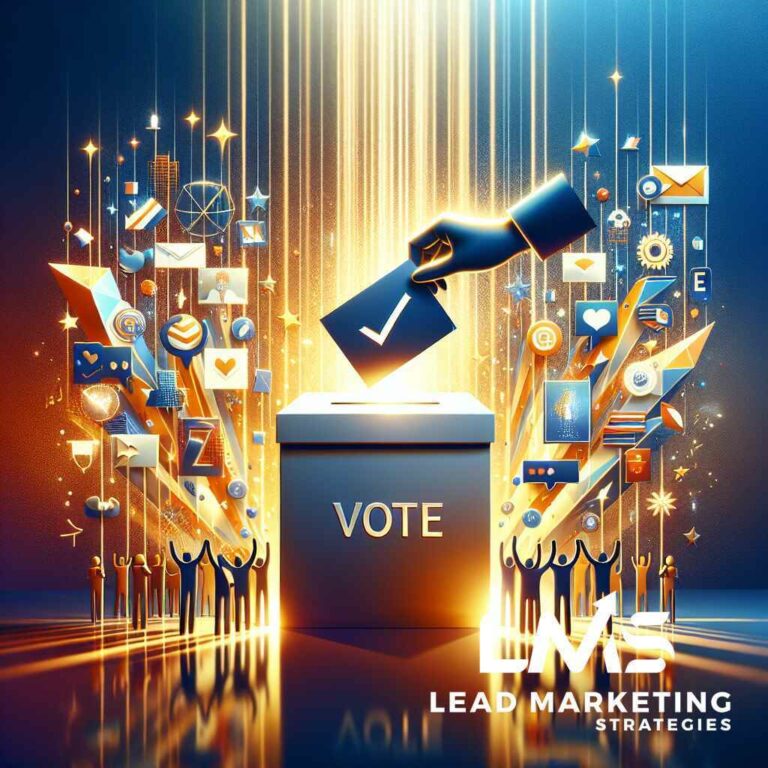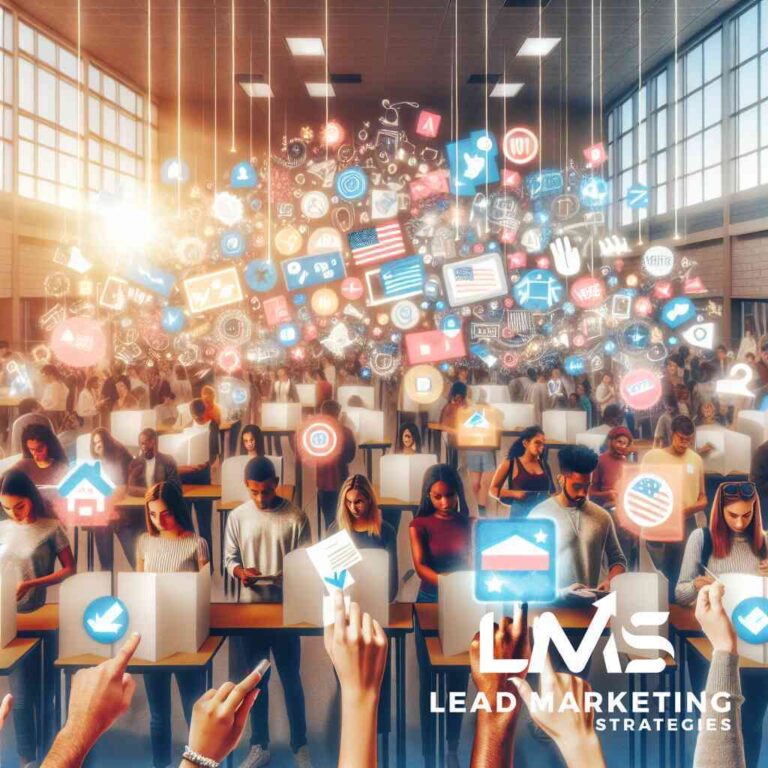Introduction to the Technological Revolution in Campaigns
Understanding the Shift Towards Digital Dominance
In recent years, political campaigns have undergone a significant transformation, largely driven by the shift towards digital platforms. As candidates and political parties navigate the complexities of modern campaigns, digital dominance becomes critical for success. This transformation is fueled by the unique capacity of digital channels to reach a vast audience quickly and efficiently. The proliferation of data allows campaign strategists to tailor messages to specific demographics, enhancing the efficacy of political content marketing strategies. Furthermore, the integration of innovative political marketing techniques into campaigns has revolutionized how candidates connect with voters, promoting more personalized and impactful engagement strategies.
Why Technology is Changing the Political Landscape
The political landscape is in a state of flux, influenced heavily by technological advancements that reshape traditional campaigning methods. Today, technology not only enhances campaign efficiency but also diversifies outreach approaches, crucial for engaging an increasingly digital-savvy electorate. For instance, tools such as AI-driven electoral analytics and predictive analytics in political campaigns offer unprecedented insights into voter behavior, allowing campaigns to adapt and refine their strategies dynamically. Moreover, the rise of social media as a tool for digital marketing for political campaigns underscores a shift towards real-time political communication, further emphasizing an age where immediacy and access to information are paramount.
The Role of Innovation in Modern Political Campaigns
Innovation remains at the heart of successful political endeavors today, driven by the necessity to stand out in a crowded digital space. With the help of AI trends in political marketing, campaigns can leverage machine learning and advanced data analytics to engage with voters more effectively and personally. Innovative tools enhance voter outreach by providing detailed insights into voter preferences and facilitating smarter decision-making processes for campaign strategists. The role of cutting-edge technologies such as augmented reality and VR further enriches voter experiences, providing immersive opportunities for voter education and interaction with political messaging. As campaigns continue to evolve, embracing technology and innovation becomes indispensable in crafting impactful political messages and achieving electoral success.
AI and Machine Learning in Political Campaigning 1
How AI is Enhancing Voter Insights
Artificial intelligence is at the forefront of political marketing services, revolutionizing how campaigns understand voter behavior. By leveraging machine learning in political campaigns, savvy strategists can analyze vast datasets to uncover patterns and preferences among the electorate. This cutting-edge approach allows campaigns to craft messages that resonate deeply with various demographics, pushing the boundaries of traditional voter engagement strategies. As AI becomes more sophisticated, campaigns can anticipate voter concerns and interests with remarkable accuracy, ensuring that their strategies are both timely and impactful. This level of insight not only enhances voter engagement but also builds a foundation of trust and relatability, critical components in the art of political marketing.
Predictive Analytics for Election Success
Predictive analytics has become an essential tool in crafting digital marketing strategies aimed at winning elections. This innovative technology anticipates electoral outcomes by analyzing historical voting patterns, demographic data, and current polling trends. By harnessing the power of predictive analytics, campaigns can allocate resources strategically, focusing efforts where they are most likely to yield electoral success. This data-driven approach takes the guesswork out of electioneering, providing a robust framework for efficient decision-making. With the integration of predictive analytics into campaign planning, political strategists can refine their messages, targeting key constituencies and issues that could sway the outcome of a tight race. The future of political advertising strategies lies in these predictive capabilities, offering a competitive edge that is gradually becoming indispensable.
Automated Campaign Management through Machine Learning
In the realm of campaign strategy development, automation driven by machine learning is revolutionizing the political landscape. Automated tools streamline campaign operations, optimizing resource allocation for more effective outreach. These tools can manage tasks ranging from voter contact initiatives to social media campaigning, significantly reducing the time and effort required by campaign staff. By automating repetitive tasks, campaigns can focus on crafting nuanced political messages and engaging directly with voters. The deployment of these technologies ensures campaigns remain agile, adapting to shifting political climates without missing a beat. With the growing complexity of digital transformation in political campaigns, automation provides a much-needed boost, allowing campaigns to maintain momentum and maximize their impact on the electorate.
Data-Driven Political Marketing Strategies
Big Data’s Impact on Voter Engagement
In political marketing, big data is a pillar of modern campaign success. By collecting and interpreting vast amounts of voter information, campaigns can craft tailored messages that resonate deeply with specific demographics. This approach not only enhances engagement but also ensures messages are delivered with precision and relevance. The impact of data-driven marketing is profound, weaving a narrative that aligns with voters’ interests and concerns.
The role of big data in elections is reshaping how political parties and candidates connect with their audiences, offering a granular understanding of voter preferences. As campaigns harness this power, it becomes imperative to integrate these insights into voter engagement strategies. The knowledge gained from big data can illuminate voters’ past behaviors and predict future actions, allowing campaigns to adapt dynamically to the evolving political climate.
Data Visualization Tools for Campaign Strategy
Data visualization tools revolutionize how political campaigns strategize and execute their plans. By translating complex datasets into comprehensible visual formats, these tools provide valuable insights into voter behavior and preferences. This technology empowers campaign teams to identify trends, pinpoint key demographics, and efficiently allocate resources. The use of visualization in political marketing strategies exemplifies how digital transformation can enhance campaign management.
These tools are essential not only for internal campaign strategy development but also for effective communication with the public. By presenting data clearly and engagingly, campaigns can build transparency and trust among constituents. Visual representation of data helps illustrate points persuasively, providing voters with a better understanding of where a candidate stands on crucial issues. In the digital age, the ability to communicate complex data effectively is a significant advantage in the political arena.
Voter Data Analysis and Smart Campaigning
The marriage of voter data analysis and smart campaigning is at the core of successful elections today. By leveraging sophisticated data analysis techniques, campaigns can uncover deep insights into voter attitudes and behaviors. This process enables the development of targeted strategies that speak directly to the needs and concerns of the electorate. The power of data analysis in political marketing strategies lies in its ability to transform raw data into actionable insights, guiding decisions such as resource allocation to key battleground areas.
Smart campaigning, driven by precise voter data analysis, ensures political messages are not only received by the right audience but also resonate on a personal level. This approach fosters a deeper connection between candidates and voters, enhancing the campaign’s overall efficacy. The strategic integration of data analysis can spell the difference between winning and losing an election, highlighting its indispensability in contemporary political marketing.
IoT and Smart Devices in Political Strategy
Leveraging IoT for Enhanced Voter Interaction
The integration of the Internet of Things (IoT) into political campaigns offers a groundbreaking approach to enhance voter interaction. By utilizing IoT technology, campaigns can create a more connected and interactive voter experience. This IoT in political campaigns leverages smart devices such as connected billboards, smart kiosks, and mobile applications to engage voters in real-time. Candidates can deploy IoT-enabled tools to push personalized notifications and campaign messages directly to citizens’ smartphones, ensuring they remain informed and engaged throughout the election cycle. This level of interaction not only elevates the campaign experience but also fosters a deeper connection between political candidates and their constituents.
By amplifying voter interaction through IoT solutions, campaigns can gather real-time feedback and instant responses from voters. This dynamic interaction model allows campaigns to adjust their political marketing strategies promptly, ensuring they align with voter expectations and preferences. By providing tailored content to voters through IoT platforms, campaigns can significantly improve their voter outreach and engagement efforts, ultimately leading to a more informed electorate and potentially increased voter turnout.
Real-Time Data Collection and Campaign Optimization
IoT devices play a crucial role in real-time data collection, offering campaigns the ability to monitor voter behavior and responses as they occur. This capability allows political strategists to gain instantaneous insights into how their messaging resonates with the public. By using smart devices like wearables and connected home assistants, campaigns can track voter sentiment and participation rates, giving them a competitive edge in adjusting their strategies dynamically.
Embracing this type of data-driven approach enables campaigns to optimize their resources and efforts more efficiently. Access to real-time data means that political marketers can implement changes in their strategies almost instantly, rather than waiting for the results of delayed data analysis. This rapid response capability is crucial in fast-paced election environments, where timing can greatly influence electoral outcomes.
Integrating Smart Devices for Political Advantage
Smart devices offer myriad opportunities for campaigns seeking to differentiate themselves in the political arena. By integrating these devices into campaign strategies, candidates can provide unique, immersive experiences that captivate and engage the electorate. For instance, in leveraging smart home technology, campaigns can deliver tailored political messages through voice-activated speakers, reaching voters where they live and spend their time.
Moreover, wearable technology can also be utilized to foster a sense of community and involvement among supporters. Campaign-affiliated apps on smartwatches can provide real-time updates, event notifications, and instant feedback mechanisms, keeping supporters connected and informed. This type of integration not only strengthens brand loyalty but also enhances the overall reach and impact of campaign efforts.
The strategic deployment of IoT and smart devices provides political campaigns with a unique advantage, setting the stage for more innovative and impactful voter engagement strategies. The ability to utilize cutting-edge technologies to connect with voters on a personal level marks a significant shift in how campaigns are conducted, pointing towards a future where tech-savvy campaigns will be better positioned to win elections.
Blockchain and Cybersecurity in Campaigns 4
Secure Voting and Data Integrity with Blockchain
Blockchain technology is a game-changer for secure voting and maintaining data integrity in political campaigns. By utilizing a decentralized and immutable ledger, blockchain ensures that every vote is securely recorded and easily verifiable, eliminating the possibility of tampering and fraud. This technological advancement provides a transparent and trustworthy voting system that can significantly enhance the credibility of elections. For political campaigns, adopting blockchain not only boosts voter confidence but also strengthens the blockchain in election security. As the technology continues to evolve, its application in electoral processes offers a future where secure voting is standard practice.
Protecting Campaigns from Cyber Threats
In an increasingly digital age, political campaigns face heightened risks from cyber threats. Protecting sensitive information is paramount, and integrating robust cybersecurity measures is essential for safeguarding campaign integrity. Advanced strategies, such as encryption and multi-factor authentication, shield campaign communications and databases from potential breaches. Utilizing blockchain technology further enhances security by providing an incorruptible method for data management. As cyber threats continue to evolve, campaigns must also adapt, implementing proactive measures that anticipate and neutralize emerging threats. By prioritizing cybersecurity, political campaigns can protect their assets and maintain public trust.
Building Trust with Secure Campaign Technology
Building voter trust is essential for successful political campaigns, and secure technology is a cornerstone of this effort. By embracing secure systems, campaigns assure constituents of their commitment to protecting personal data and electoral integrity. Blockchain technology plays a pivotal role by ensuring transparency in campaign operations and fostering a climate of trustworthiness. The strategic use of secure technologies not only enhances campaign reputation but also aligns with broader politics and digital marketing trends towards data protection and privacy. As political landscapes become more complex, secure technology will continue to be a critical component of effective campaign strategy.
Augmented and Virtual Reality in Voter Engagement 5
Immersive Experiences for Voter Education
Immersive technologies like augmented and virtual reality are transforming how political campaigns educate voters. These advanced tools provide a 360-degree understanding of complex political issues, enhancing the political content marketing landscape. By integrating augmented reality for voter engagement, candidates can offer experiential learning, making information more accessible and engaging for constituents. Interactive simulations allow voters to navigate policy scenarios, increasing their understanding of potential outcomes. The use of virtual reality in political campaigns fosters a sense of presence and involvement, ensuring that political messages resonate more deeply.
These technologies facilitate impactful voter education campaigns, enabling citizens to explore political stances and candidates’ capabilities through engaging digital spaces. The advantage lies in the ability to personalize and adapt messages in response to voter feedback, thus continuously improving the outreach and effectiveness of campaign strategies. As political messaging evolves, these immersive experiences will shape the future of political education and voter engagement, positioning campaigns that utilize them as forward-thinking and voter-centric.
Virtual Campaign Rallies and Events
The adoption of virtual reality has revolutionized traditional political rallies, offering unprecedented access and inclusivity. With virtual campaign rallies, candidates can connect with a broader audience regardless of geographical barriers, creating an inclusive platform for political discourse. This shift towards digital events emphasizes the role of technology in elections and campaign technology, offering innovative methods to gather support and momentum.
These virtual events allow for interactive elements such as live Q&A sessions, real-time polling, and direct voter communication, which enhance voter engagement strategies. The reduced logistical costs and the ability to reach voters globally mean that campaigns can allocate resources more efficiently while maximizing their outreach efforts. As digital transformation in politics continues to progress, virtual campaign rallies will become an essential component of modern election strategies, driving meaningful voter interactions and broadening the scope of candidate outreach.
Enhancing Engagement with Augmented Reality Tools
Augmented reality tools provide groundbreaking opportunities for political campaigns seeking to elevate voter engagement. By overlaying digital information onto the real world, AR technologies enable interactive and personalized voter experiences. Campaigns can utilize AR for initiatives such as walking tours detailing candidates’ achievements, interactive billboards, and team-building games for supporters. Such immersive tools transform political marketing in Vermont into a dynamic arena where voters actively participate in the campaign narrative.
These technologies also facilitate data-driven insights, allowing campaigns to collect and analyze voter interactions seamlessly. By leveraging AR’s interactivity, campaigns can refine their political branding in the digital age, crafting narratives that resonate and engage. The incorporation of augmented reality not only enhances voter experiences but also offers campaigns the potential to differentiate themselves in a competitive political landscape, fostering a new era of tech-enabled voter participation.
The Digital Transformation of Political Advertising
Innovations in Election PPC Advertising
Pay-per-click (PPC) advertising has completely transformed the game for political campaigns, offering precision and immediate impact in reaching voters. Through sophisticated targeting and real-time data analytics, PPC advertising allows campaigns to pinpoint specific voter segments and deliver tailored messages effectively. This approach ensures that resources are utilized optimally, maximizing return on investment by focusing on key demographics. Moreover, using PPC advertising strategies, campaigns can implement rapid adjustments based on performance insights, ensuring that political messages remain relevant and impactful. In this evolving landscape, staying ahead of PPC advertising trends is crucial for crafting cutting-edge campaign methods that truly resonate with today’s electorate.
Embracing Social Media for Campaign Success
Social media’s impact on political campaigns is undeniable, reshaping how candidates communicate and engage with their audience. Platforms like Facebook, Twitter, and Instagram have become essential tools for election social media marketing, offering direct channels for outreach and engagement. Campaigns that effectively utilize social media can reach a broader audience, create engaging content, and instigate meaningful conversations. This digital transformation in political campaigns fosters an environment where immediacy and interaction drive voter action. By employing targeted social media strategies, campaigns can encourage voter participation and strengthen their online presence, proving these platforms are not just auxiliary tools but central to modern political marketing solutions.
Digital Campaign Innovations and Future Trends
As we look towards the future, digital transformation in political campaigns continues to set the pace for all political advertising strategies. Emerging technologies like advanced data analytics, augmented reality voter engagement, and immersive virtual campaign experiences are becoming integral components of next-gen political strategies. Innovations in digital tools enable campaigns to be more agile, data-driven, and engaging than ever before. For example, leveraging political campaign strategies in New York can provide campaigns with tailored insights and state-specific strategies. The innovation curve in digital political marketing is steep, necessitating continuous adaptation and learning to stay competitive in a rapidly changing landscape. Political marketing near Vermont and beyond will increasingly rely on tech-driven solutions to meet voter expectations and campaign goals efficiently and effectively.” }
Concluding Insights on the Future of Campaign Technology
The Road Ahead for Tech-Driven Campaign Strategies
As we venture further into an era dominated by technological innovation, the future of political campaigns will rely heavily on embracing emerging technologies. The digital transformation in political campaigns highlights the urgency for candidates to adopt innovative tools like AI, IoT, and blockchain to stay competitive. Integrating these technologies ensures that campaigns are not only relevant but also resonate deeply with a digitally-native electorate. As strategies evolve, political marketing firms like Lead Marketing Strategies stand at the forefront, providing political marketing near Vermont and beyond with the resources and expertise required to harness these advancements effectively. The road ahead is promising, underscoring a transition to more dynamic, impactful campaign methodologies.
Balancing Innovation and Ethics in Campaigns
While technological innovation opens new avenues for campaign success, it also necessitates a robust ethical framework. The adoption of powerful tools like machine learning and data analysis raises questions about privacy, consent, and ethical use. Politicians must balance innovation with ethical responsibility, ensuring that personal data is handled with integrity and respect. Ethical campaign strategies not only foster public trust but also enhance the overall image of political entities. With lead marketing strategies that lead with ethical solutions in political content marketing, campaigns can resonate with voters while maintaining high ethical standards. The dual pursuit of innovation and ethics is key to crafting a future-ready political landscape.
Preparing for the Next Generation of Political Marketing
The continuous evolution of political marketing demands preparation for an emergent landscape defined by technological sophistication and voter expectations. Future campaigns will likely incorporate even more advanced tools and methodologies, requiring political marketers to stay ahead of trends and developments. Innovative political marketing techniques must be continually refined to captivate and engage a discerning electorate. By leveraging insights, such as those gained from political campaign insights in Ohio, campaigns can anticipate shifts and recalibrate their strategies accordingly. The commitment to next-generation strategies ensures campaigns remain adaptable and poised for success, cementing their role as pioneers in the political arena.
Frequently Asked Questions
Question: How do Political Marketing Strategies integrate AI in political campaigns to enhance voter insights?
Answer: Political Marketing Strategies employs machine learning for voter insights by analyzing extensive datasets to decode voter behavior. Exploring the Complexities of Voter Data Analytics. This approach enables us to craft messages that deeply resonate with varied voter demographics, ensuring effective voter engagement strategies. Our advanced use of AI-driven electoral analytics provides political campaigns with a competitive edge, allowing strategists to anticipate voter concerns accurately and adjust tactics dynamically. By leveraging AI, our clients can achieve cutting-edge campaign methods that are both impactful and reliable, fostering trust and effectiveness in their political marketing solutions.
Question: In what ways do next-gen political strategies by Political Marketing Strategies utilize big data in elections?
Answer: At Political Marketing Strategies, our next-gen political strategies leverage big data to reshape campaign effectiveness. We focus on collecting and interpreting vast voter information to craft precision-targeted messages, ensuring they are relevant and resonate deeply with specific audiences. Our data-driven political marketing processes reveal voter preferences and trends, allowing campaigns to adapt their outreach dynamically. Consequently, this enhances election result analysis, contributing to more efficient campaign finance marketing and strategic resource allocation. Embracing this approach ensures our clients are well-equipped for the evolving digital transformation in politics.
Question: What role does blockchain play in the cybersecurity of political campaign,s as suggested in the blog ‘Top 5 Campaign Technologies Redefining the Future’?
Answer: In the blog ‘Top 5 Campaign Technologies Redefining the Future,’ we emphasize blockchain’s pivotal role in securing voting and maintaining data integrity in political campaigns. Political Marketing Strategies adopts blockchain technology to ensure a transparent and unalterable voting process, eliminating risks of tampering and fraud. Providing a decentralized and secure ledger boosts voter confidence and enhances the credibility of electoral processes. By integrating blockchain in campaigns, we commit to safeguarding data, which is crucial for building trust and upholding the integrity of political entities in an era marked by increasing cybersecurity threats.
Question: How do Political Marketing Strategies use IoT to enhance voter interaction in political campaigns?
Answer: Political Marketing Strategies enhances voter interaction through the innovative use of IoT in political strategy. By leveraging smart devices and connected technologies, we create a highly interactive campaign experience that keeps voters informed and engaged. Applications like smart kiosks and mobile platforms push real-time personalized notifications, enhancing voter outreach and engagement. Mastering Political PR Near You with Political Marketing Strategi.es Our integration of IoT solutions means we can gather and respond to voter feedbacinstantaneouslyly, enhancing campaign optimization. This interactivity allows for more meaningful voter interactions and positions our clients at the forefront of smart political campaigning.
Question: What innovative political technologies does Political Marketing Strategies offer for augmented reality in voter engagement? Ultimate Guide to Top Election Technologies at Political Marketing Strategies
Answer: Political Marketing Strategies offers transformative augmented reality solutions to elevate voter engagement. Our immersive AR tools enable campaigns to dynamically interact with constituents, offering experiences such as virtual candidate walkthroughs or interactive policy demonstrations. This technology allows voters to understand complex political issue more engaginglys, enhancing their educational experience. By incorporating augmented reality into political branding initiatives, we help campaigns stand out and deliver memorable voter experiences, aligning with emerging campaign technology trends to capture the attention and engagement of modern electorates.





